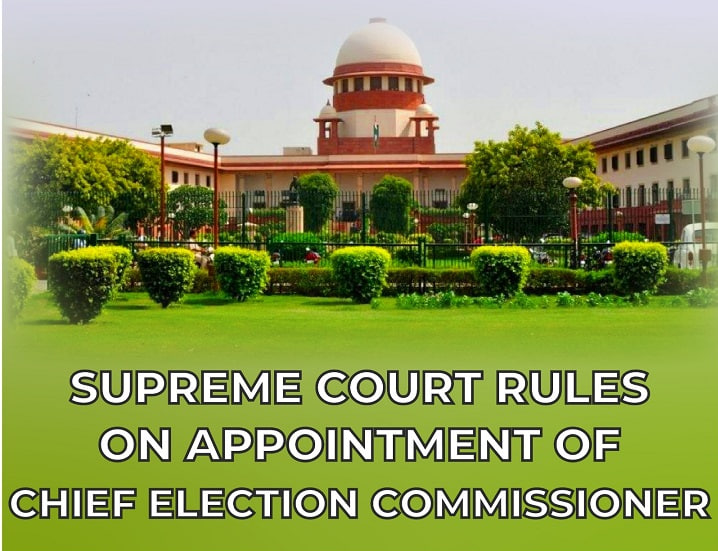Description

Copyright infringement not intended
Context: A five-judge Constitution Bench of the Supreme Court held unanimously that the Chief Election Commissioner (CEC) and Election Commissioners must be chosen by a high-power committee consisting of the Prime Minister, the Leader of the Opposition in the Lok Sabha, and the Chief Justice of India (ECs).
Details
- Currently, the central government has the authority to choose members of the Election Commission. The Supreme Court has now granted the judiciary and the opposition a voice in the matter, stating that the CEC and ECs must be selected by the President on the recommendation of a committee made up of the prime minister, the leader of the opposition in the Lok Sabha, and the Chief Justice of India.
- This landmark judgment, which aims to alter the process for choosing India's top election officials, might have a huge impact.
.jpeg)
Election Commission of India
- It is a permanent constitutional body under Article 324 of the Indian constitution.
- The Election Commission of India supervises the conduct of elections to the Parliament and Legislature of every State and elections to the offices of the President and Vice-President of India.
- It consists of the Chief Election Commissioner and two Election Commissioners.
- Originally, there was only Chief Election Commissioner, there were no Election Commissioners.
Appointment of Election Commissioner
- The President appoints Chief Election Commissioner and Election Commissioners.
- Tenure of 6 years, or up to 65 years of age, whichever is earlier.
- The status, salary and perks of election commissioners are equivalent to Judges of the Supreme Court of India.
- The Chief Election Commissioner can be removed from office only through impeachment by Parliament.
- The President can remove other members in consultation with the Chief Election Commissioner.
- The President may appoint Regional Election Commissioners in consultation with the CEC before elections to the Parliament or Assemblies.
- The Chief Election Commissioner cannot hold any office of profit after retirement.
- The Chief Election Commissioner cannot be reappointed to the post.
- The legal, educational, administrative, or judicial qualifications of the Election Commission members are not specified in the Constitution.
- The term of the Election Commission's members is not specified in the Constitution.
- The Constitution does not prohibit the government from appointing retiring election commissioners in the future.
Powers of the Election Commission
- The EC enjoys complete autonomy and is insulated from any interference from the Executive.
- It also functions as a quasi-judicial body regarding matters related to elections and electoral disputes.
- Its recommendations are binding on the President of India.
- However, its decisions are subject to judicial review by High Courts and the Supreme Court acting on electoral petitions.
- During the election process, the entire Central and state government machinery (including paramilitary and police forces) is deemed to be on deputation to the Commission.
- The Commission takes effective control of government personnel and movable and immovable property for the successful conduct of elections.

Functions of the Election Commission
- Demarcation of constituencies.
- Preparation of electoral rolls.
- Issue notification of election dates and schedules.
- Establish and enforce a code of conduct.
- Scrutiny of nomination papers of candidates.
- Scrutiny of election expenses.
- Allot symbols and accord recognition to political parties.
- Render advice to the President and Governors regarding the disqualification of MPs and MLAs.
- Allot schedules for broadcast and telecast of party campaigns.
- Grant exemptions to persons from disqualifications imposed by judicial decisions.
|
PRACTICE QUESTION
Q. Consider the following Statement with reference to the Election Commission of India
1. It is a permanent constitutional body under Article 324 of the Indian constitution.;
2. It supervises the conduct of elections to the Parliament and Legislature of every State and elections to the offices of the President and Vice-President of India.
3. The status, salary and perks of election commissioners are equivalent to Judges of the Supreme Court of India.
Which of the following Statement is/are correct?
(A) 1 only
(B) 2 only
(C) Both 1 and 2
(D) Neither 1 nor 2
Answer: D
Explanation:
Statement 1 is correct: Election Commission of India is a permanent constitutional body under Article 324 of the Indian constitution.
Statement 2 is correct: The Election Commission of India supervises the conduct of elections to the Parliament and Legislature of every State and elections to the offices of the President and Vice-President of India.
Statement 3 is correct: The status, salary and perks of election commissioners are equivalent to Judges of the Supreme Court of India.
|

https://indianexpress.com/article/explained/explained-law/chief-election-commissioner-appointment-explained-supreme-court-ruling-8474745/











